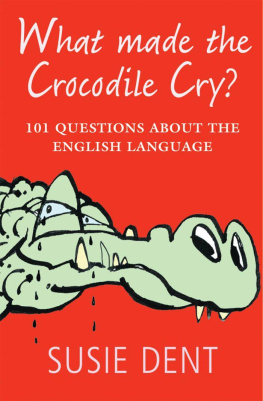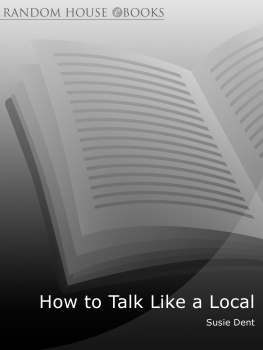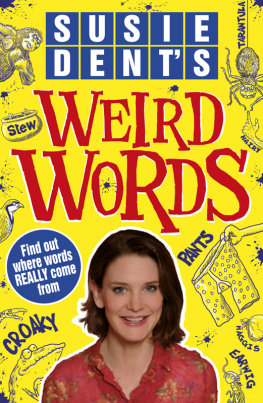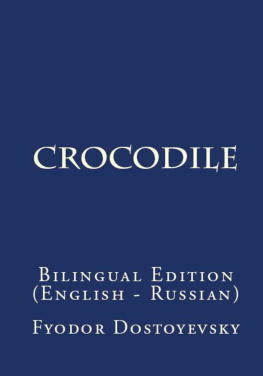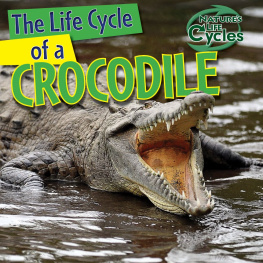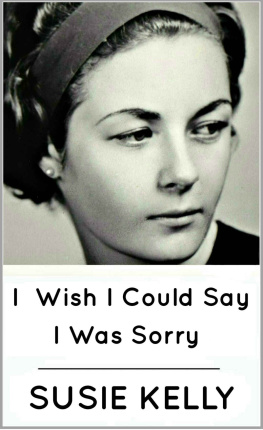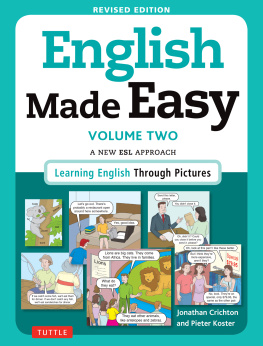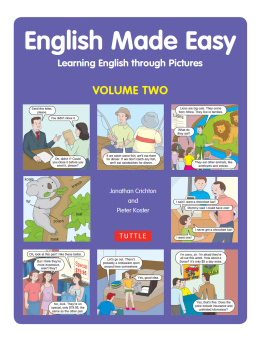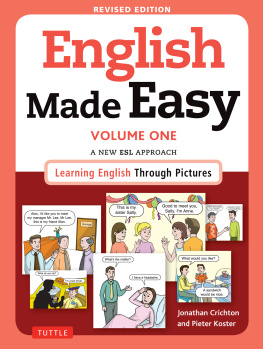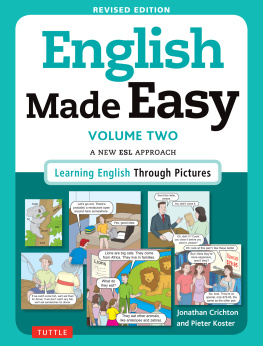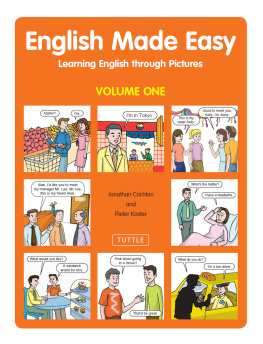Susie Dent - What Made the Crocodile Cry?: 101 Questions about the English Language
Here you can read online Susie Dent - What Made the Crocodile Cry?: 101 Questions about the English Language full text of the book (entire story) in english for free. Download pdf and epub, get meaning, cover and reviews about this ebook. year: 2009, publisher: Oxford University Press, genre: Religion. Description of the work, (preface) as well as reviews are available. Best literature library LitArk.com created for fans of good reading and offers a wide selection of genres:
Romance novel
Science fiction
Adventure
Detective
Science
History
Home and family
Prose
Art
Politics
Computer
Non-fiction
Religion
Business
Children
Humor
Choose a favorite category and find really read worthwhile books. Enjoy immersion in the world of imagination, feel the emotions of the characters or learn something new for yourself, make an fascinating discovery.
- Book:What Made the Crocodile Cry?: 101 Questions about the English Language
- Author:
- Publisher:Oxford University Press
- Genre:
- Year:2009
- Rating:5 / 5
- Favourites:Add to favourites
- Your mark:
- 100
- 1
- 2
- 3
- 4
- 5
What Made the Crocodile Cry?: 101 Questions about the English Language: summary, description and annotation
We offer to read an annotation, description, summary or preface (depends on what the author of the book "What Made the Crocodile Cry?: 101 Questions about the English Language" wrote himself). If you haven't found the necessary information about the book — write in the comments, we will try to find it.
What Made the Crocodile Cry?: 101 Questions about the English Language — read online for free the complete book (whole text) full work
Below is the text of the book, divided by pages. System saving the place of the last page read, allows you to conveniently read the book "What Made the Crocodile Cry?: 101 Questions about the English Language" online for free, without having to search again every time where you left off. Put a bookmark, and you can go to the page where you finished reading at any time.
Font size:
Interval:
Bookmark:

QUESTIONS ABOUT THE ENGLISH LANGUAGE
Susie Dent


Great Clarendon Street, Oxford OX 2 6 DP
Oxford University Press is a department of the University of Oxford.
It furthers the Universitys objective of excellence in research, scholarship,
and education by publishing worldwide in
Oxford New York
Auckland Cape Town Dar es Salaam Hong Kong Karachi
Kuala Lumpur Madrid Melbourne Mexico City Nairobi
New Delhi Shanghai Taipei Toronto
With offices in
Argentina Austria Brazil Chile Czech Republic France Greece
Guatemala Hungary Italy Japan Poland Portugal Singapore
South Korea Switzerland Thailand Turkey Ukraine Vietnam
Oxford is a registered trade mark of Oxford University Press
in the UK and in certain other countries
Published in the United States
by Oxford University Press Inc., New York
Oxford University Press 2009
The moral rights of the authors have been asserted
Database right Oxford University Press (maker)
First published 2009
All rights reserved. No part of this publication may be reproduced,
stored in a retrieval system, or transmitted, in any form or by any means,
without the prior permission in writing of Oxford University Press,
or as expressly permitted by law, or under terms agreed with the appropriate
reprographics rights organization. Enquiries concerning reproduction
outside the scope of the above should be sent to the Rights Department,
Oxford University Press, at the address above
You must not circulate this book in any other binding or cover
and you must impose the same condition on any acquirer
British Library Cataloguing in Publication Data
Data available
Library of Congress Cataloging in Publication Data
Data available
Printed in Great Britain
on acid-free paper by
Clays Ltd, St Ives plc
ISBN 978019957415-5
1 3 5 7 9 10 8 6 4 2
I love words and I love Susie Dent, so it seems right that Im here writing the foreword for Susies new book. Susie and I have known each other a long time, having been thrown into dictionary corner on Countdown together and it has been one of my favourite things to do since the very beginning. I have marvelled over the years at Susies erudition and envied it.
I always wanted to be one of those people at parties who had the answer to random questions that crop up about the origin of words and phrases and often fantasised about slinging out perfectly formed, witty answers to peoples questions, garnering admiration wherever I went. Alas, it was never like that. Like everyone else, I turned a blank questioning face to the enquiry, and wished that there was a little book I could keep at home, study it before I went out and impress wherever I went. And now there is such a book. Hurrah!
But many of you may not be as sad as me. You might be the sort of person whos just interested in words and phrases and doesnt feel the need to impress others with the length and breadth of your knowledge.
You will get as much, if not more pleasure, out of this book, because you wont feel the need to learn it off by heart like me. Ive decided that in order to gain maximum advantage, I will learn some of the more obscure origins and then engineer it so other people ask questions about them and I can casually answer them.
So if you ever wanted to know why we have a whip round or if youre a housewife or a hussy,... or both even, this is the book for you.
For me, its the bees knees, oh crikey yes. What serendipity, Im going to put my bikini on and get mullered. Happy reading folks.
Jo Brand
Curiosity famously killed the cat: an expression that comes high on the list of the most frequently posed questions about the origins of English. Not bad going for an idiom that in one form or another dates back to the sixteenth century.
But then so many characteristics of our language exert as much fascination today as they did hundreds of years ago. While usage, grammar, and spelling are the sources of our biggest bugbears, our greatest curiosity has always been individual words and expressionstheir origins, their changes over time, their strangeness or beauty. But usage, grammar, and spelling can also intrigue. The questions English invites will never dry up simply because it is constantly evolving. Not for a single second in its 1,500-year history has English stood still, a fact that is as compelling to some as it is frustrating to others. Wherever you stand, whether you long for a linguistic golden age now passed or embrace todays new words with relish, the passion that English arouses is as strong as ever.
This book doesnt set out to answer the top 101 questions from a particular poll: certainly some of the standards are therejust what is a white elephant, why was Larry so happy, and who was Bob uncle to? (And what, while were at it, is the point of that last Oxford comma?), but I have also included many of the riddles and curiosities that I didnt know existed before setting out, but which I then found irresistible. Why is it that only women get hysterical? Why isnt there a synonym for a thesaurus? Have there always been so many words in English for being drunk? And just who were flipping Ada and bloody Nora?
Questions about English are far from new. With the arrival of the printing press, those who needed to standardize a chaotic but wonderfully rich oral language must have deliberated long and hard over meanings and spellings. Shakespeare, coiner of so many words himself, will have pondered the stories behind the idioms and expressions he inherited. And with the arrival of William the Conqueror in 1066, Britons had to make hundreds of vocabulary choices as French began to hold sway over the incumbent Anglo-Saxon. Language, and particularly English, has never been a given. It has always been a choice, and a democratic one at that.
Some questions, of course, simply cant be answered. Those imponderables that I have included are there because, for me, their mystery seems itself to be in some way significant. We shall never know why cutting the mustard is a good thing (p. 10), but the journey of mustard as slang is a near-perfect example of how the literal can jump the fence into all sorts of figurative terrains. If a geek used to bite the heads off live chickens, what did the original nerd do when it left the pages of Dr Seusss imagination? Word detection is as open-ended as the objects of its study: some day we may discover the truth, but for now all the fun is in the educated guessing.
In the sixteenth century it was care or worry which proverbially killed the cat. Curiosity turned up some three hundred years later. But while an eagerness to know may have done for our feline companions ever since, it has clearly kept our language alive. As long as we puzzle over English, we nurture it, and the story behind the next new word or phrase will be just around the corner. A billion and one questions would never be enough to do it justice.
Susie Dent
October 2009
Font size:
Interval:
Bookmark:
Similar books «What Made the Crocodile Cry?: 101 Questions about the English Language»
Look at similar books to What Made the Crocodile Cry?: 101 Questions about the English Language. We have selected literature similar in name and meaning in the hope of providing readers with more options to find new, interesting, not yet read works.
Discussion, reviews of the book What Made the Crocodile Cry?: 101 Questions about the English Language and just readers' own opinions. Leave your comments, write what you think about the work, its meaning or the main characters. Specify what exactly you liked and what you didn't like, and why you think so.

